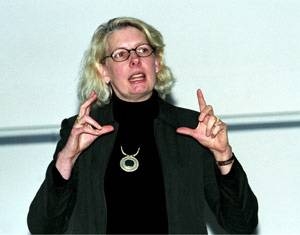A Feb. 8 conference showcased research projects of the Comparative Media Studies Program , including a new multimedia project on Melville's "Moby Dick."
"A central strand of the Comparative Media Studies Program has focused on the ideal of 'applied humanism'--putting the expertise of humanists, artists and social scientists to work to confront real-world challenges. This event helped display the fruits of our first three years of labor," said Henry Jenkins, director of the Comparative Media Studies Program (CMS).
A session on transforming humanities education (a project supported by the d'Arbeloff Fund for Excellence in Education at MIT) presented both new teaching materials and new strategies for forming learning communities across disciplines and distances.
"The MetaMedia archives are a flexible environment in which to create and share research across different levels of interest, knowledge and skill," said Peter Donaldson, head of the literature section. "Meaning unfolds in multimedia work. Students who create subject-specific mini-archives make entirely new use of the classroom and the teacher-student relationship."
Donaldson also introduced the Shakespeare Electronic Archive, an extensive collection of early quarto and folio texts of Shakespeare's plays in electronic form, as well as 1,400 illustrations of Hamlet and several Hamlet films.
Wyn Kelley, a lecturer in literature, created a new MetaMedia project titled "Melville: The Midnight Forecastle," to offer students a "novel, nonlinear way to gain a sense of the richness of 'Moby Dick.'"
Other CMS MetaMedia projects include "Berliner Sehen," a hypermedia documentary for German studies featuring video and historical documents created by research associate Kurt Fendt and senior lecturer Ellen W. Crocker of foreign languages and literatures (FLL); and "Modulos Culturales: Espana de Cerca," created by FLL lecturers Margarita Ribas Groeger and Adriana Gutierrez-Gonzales.
"Espana de cerca" is a web-based module incorporating video interviews, articles and documentary materials gathered in Spain. "Its purpose is to provide students with rich authentic materials that will improve their language skills while expanding their cultural understanding of life in modern Spain," said Gutierrez-Gonzales.
A version of this article appeared in MIT Tech Talk on February 27, 2002.






